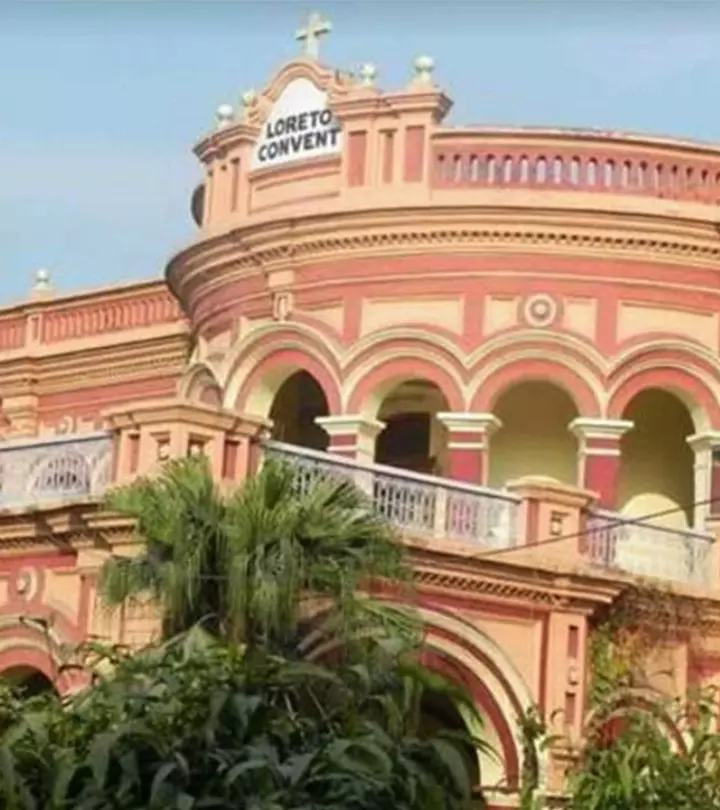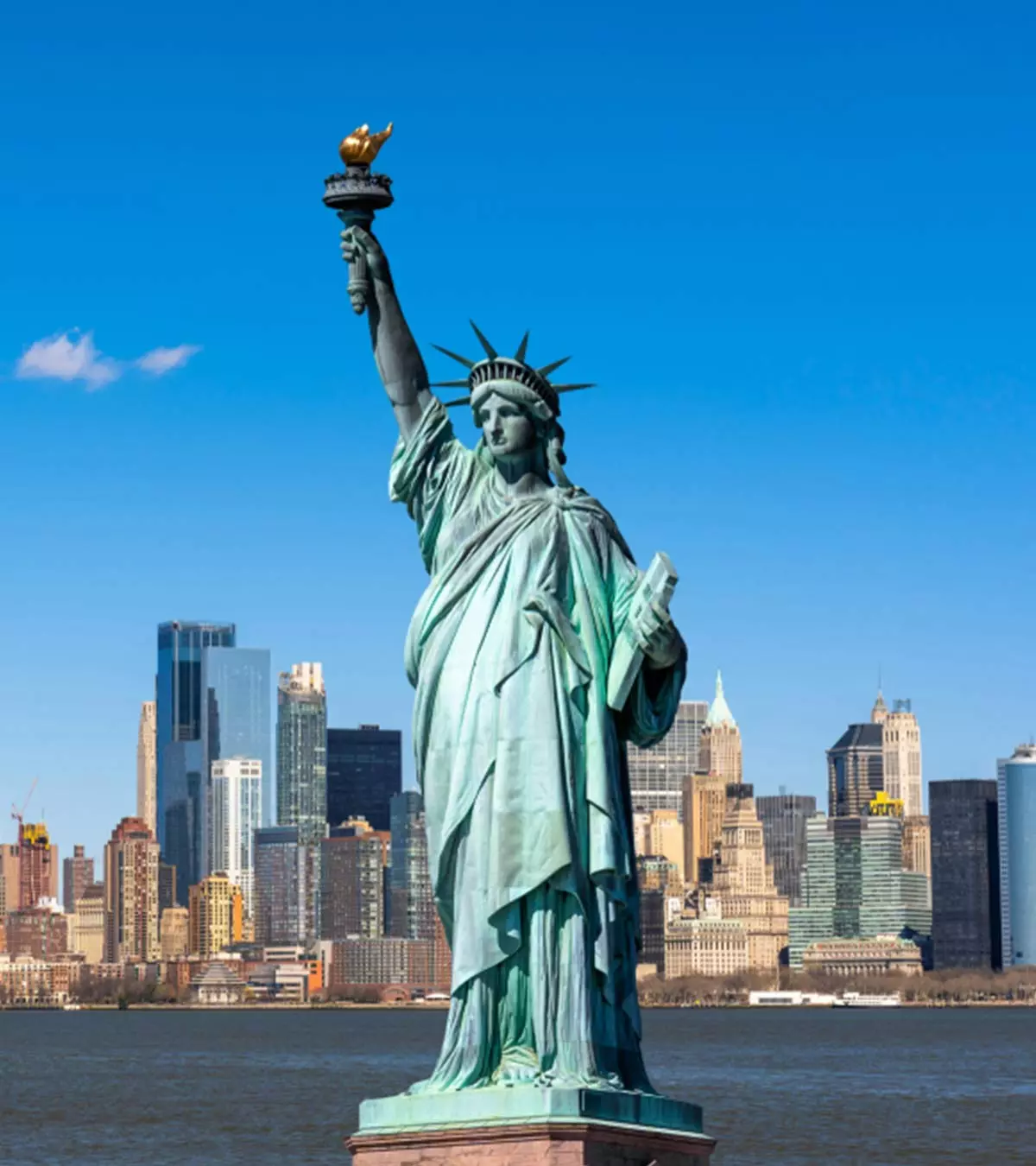
The Statue of Liberty is an enormous neoclassical sculpture that got its name from Libertas, the Roman Goddess of freedom. It is a global symbol of freedom. The statue was an icon of friendship between the United States and France. Also, it has become an emblem of opportunities, freedom, and dreams over the years. Interestingly, the torch of the historic statue used to be an observation deck. This post brings you some exciting and fun facts about the Statue of Liberty. You may share them with your children and play trivia games as well.
Key Pointers
- The idea of constructing the Statue of Liberty was put forth by a French anti-slavery activist, Edouard de Laboulaye, to signify friendship.
- Frederic Auguste Bartholdi, the French sculptor who sculpted the statue, used his mother’s facial features as inspiration.
- The statue was built in parts, oxidized entirely in 20 years, weighs around 220 tons, and more interesting facts as you read on.
50 Statue Of Liberty Facts For Kids
- The Statue of Liberty is also called “Lady Liberty” and the “Mother of Exiles.” It was originally named “Liberty Enlightening the World.” which reflects its purpose to inspire enlightenment and liberty around the globe. The iconic Lady Liberty serves as a beacon of hope for individuals of diverse backgrounds.
- A symbol of opportunities for immigrants, the Statue of Liberty stands on Liberty Island, overlooking southeast to welcome ships coming into New York Harbor.
- The Statue of Liberty was built in France in 1882 and was dedicated on October 28, 1886. It was a gift from France to the American people.
- The idea of building the statue as a symbol of friendship was put forward by the French anti-slavery activist, Edouard de Laboulaye.
- The main statue was built in parts. First, the arm and torch were constructed, followed by the head. Similarly, the rest of the structure was built in parts over a period of years.
- When the arm holding the torch was completed, it was displayed at the Centennial Exhibition in Philadelphia in 1876, while the head was kept on display at the Paris World’s Fair in 1878.
- When measured from the base to the torch, the statue is 151ft tall, and when measured from the pedestal and foundation, the statue is 305ft tall (1). The face of the statue alone is 8ft tall.
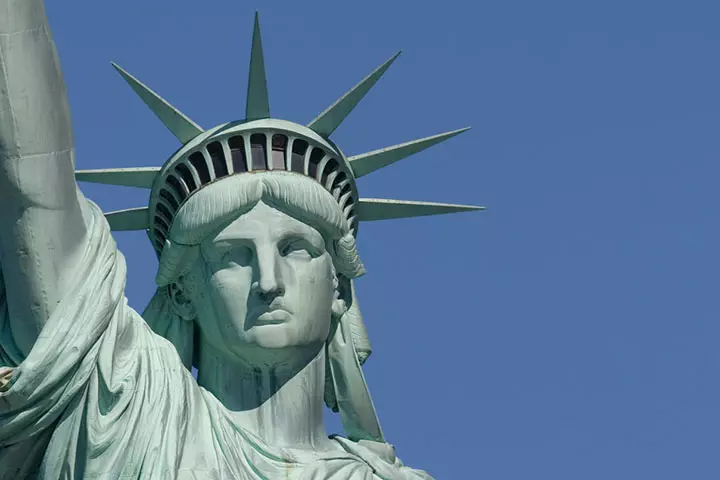
Image: IStock
- The French sculptor Frederic Auguste Bartholdi sculpted the statue. For the face of the statue, he used his mother’s facial features as inspiration.
- The internal frame of the statue was built using stainless steel and cast iron covered with a sheet of pure copper.
 Quick fact
Quick fact- The bright flame of the torch was also coated with copper, but after it was damaged during World War I, it was repaired and coated with a layer of 24k gold. Also, entry to the torch, for visitors, has been closed down since then.
- The blue-green color on the outer side of the statue is due to the oxidation it undergoes because of its placement outdoors and under the sun.
- It took 20 years for the statue to oxidize completely and become the greenish-blue color it is today.
- The torch was initially used as a lighthouse for ships until it was restored in 1986. It was the first lighthouse to make use of electric lamps.
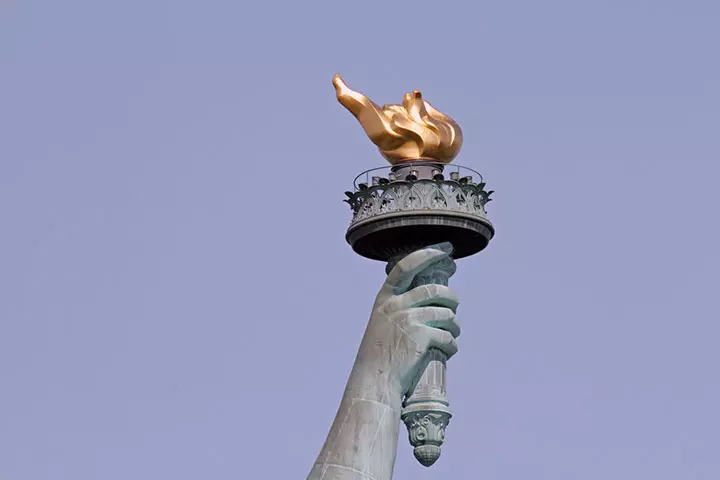
Image: IStock
- The crown on the head of the statue has seven spikes, representing the seven continents on Earth. Each of the seven rays is nine-feet long.
- Liberty Island was actually a part of the Oyster Islands Chain when it was called the “Love Island.” Later, a Dutch Colonist named Isaac Bedloe took over the island and named it “Bedloe Island,” and it remained so until it was renamed in 1956.
- This island was selected for the placement of the monument because Bartholdi saw the 10-acre island as a “Gateway to America.”
- The statue depicts a figure holding both a torch and a tablet. The tablet bears an inscription of the date of the Declaration of Independence of the US, which is July 4, 1776.
- At the base of the statue lie pieces of broken shackles, which symbolize the breaking of oppression.
- The structure of the statue is not perfect. Its head and shoulders are misaligned as the head is placed a few feet farther away than it should actually be.
- The crown of the statue has a row of 25 windows. From that height, you can see the tablet in the statue’s hand and read the date JULY IV MDCCLXXVI engraved on it.
- The 92ft tall spine of the statue was designed by the French engineer Gustave Eiffel, the man behind the Eiffel Tower. This copper spine is the main support for the interior of the structure.
- Gustave Eiffel was the replacement for Eugene Viollet-le-Duc, the statue’s original architect, who passed away in 1879.
- The pounding of copper over the statue was completed using around 300 different types of hammers.
- For the construction of the statue, an amount of $102,000 was raised through donations from both American and French citizens.
- While the statue was sent to the US from France, the pedestal was constructed entirely in the US.
- Joseph Pulitzer helped raise around $100,000 to create a pedestal for the statue, stating that the Earth could not withstand the weight of this huge structure.
 Did you know?
Did you know?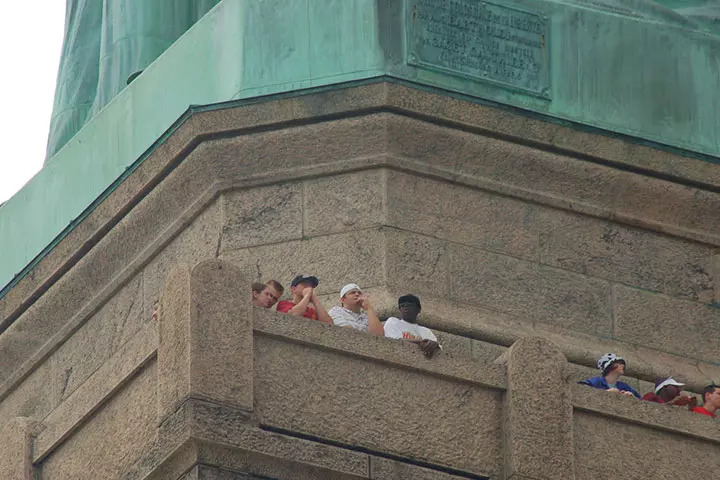
Image: IStock
- In 1883, the American author Emma Lazarus composed the sonnet “The New Colossus” to raise funds for building the pedestal. The sonnet furthered the notion that the Statue of Liberty was welcoming immigrants.
Her poem is engraved on a bronze plaque and placed on display for visitors at the entrance of the pedestal.
- The pedestal was designed by the American architect Richard Morris Hunt.
- An image of the statue’s torch is printed on every $10 bill in the US.
- The replica of the Statue of Liberty on the island of Ile aux Cygnes in Paris stands facing the west, in line with the original monument in New York.
- The statue was sent in 350 parts and 214 crates from France through the French frigate “Isere.” It took America four months to reassemble the statue.
- Following the “Antiquities Act,” President Calvin Coolidge declared the Statue of Liberty as a ‘National Monument’ on October 15, 1924 (2).
- Liberty Island, along with Ellis Island, was also declared a part of the Statue of Liberty National Monument in 1984. UNESCO added it to its “World Heritage List” in 1984.
- The base of the monument holds a museum for visitors. This museum displays the original torch placed on the statue.

Image: IStock
- On June 3, 1980, a bomb exploded in the Statue of Liberty Museum Story Room. There were no human casualties, but several exhibits were destroyed in the attack. The attack caused a total damage of around $18,000.
- October 28 is considered as the birthday of the Statue of Liberty since it was the day it was dedicated.
- If you wish to reach the crown of the statue, you will have to climb 162 narrow and steep stairs from the pedestal as there is no elevator to take you high up there (3).
- The elevator of the statue can take visitors only up to the observation deck on the pedestal.
- The Statue of Liberty weighs around 220 tons. (4)
- The feet of the Statue of Liberty is 25ft long, which means her shoe size would be 879.
- Lady Liberty has a waistline of 35ft.
- This iconic structure sees around four million visitors in a year.
- Currently, the US National Park Service manages the Statue of Liberty. It was first managed by the United States Lighthouse Board from 1886 to 1901, and then, the Department of War from 1901 to 1933.
- At the dedication ceremony, the US President Grover Cleveland famously quoted that the statue’s “stream of light shall pierce the darkness of ignorance and man’s oppression until Liberty enlightens the world.”
- Lady Liberty was constructed over a period of nine years.
- The Statue of Liberty was considered a symbol of immigration over the latter half of the 19th century. This is because when millions of immigrants arrived in the US by boat, the first thing they saw was the Statue of Liberty.
- The statue has made an appearance in several Hollywood movies such as Independence Day, The Day After Tomorrow, and Planet of the Apes.
- It is believed that Lady Liberty is hit by around 600 bolts of lightning every year. One such instance was captured in a photo in 2010.
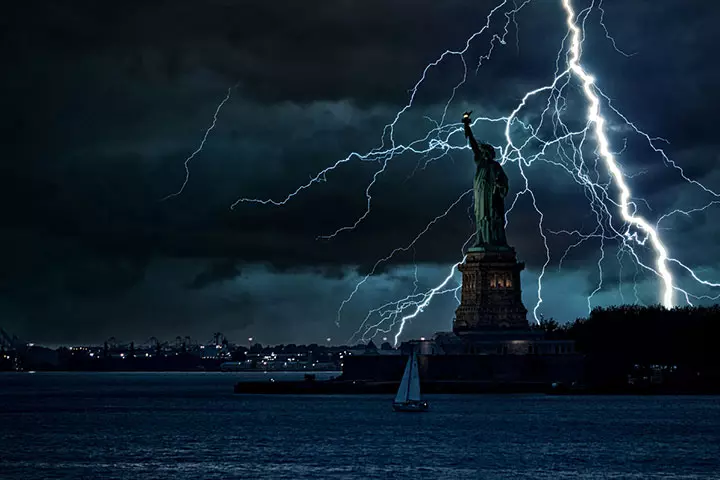
Image: IStock
- Visitors are allowed to visit Liberty and Ellis islands through the ferry system. Private boats are not permitted to dock at either of these two islands.
 Quick tip
Quick tip- Liberty Island may be closer to the State of New Jersey, but it is considered a federal property within the territory of the State of New York.
Sharon Rowley, a mother and blogger, shares from her trip to the Statue of Liberty that it was a worthwhile experience for her and the children. She says, “During our visit, we enjoyed a tour around the statue given by one of the National Park Service Rangers. Tours start every 30 minutes or so in the park-like area behind the statue, and rangers lead walks around the perimeter of the statue as they impart the history of Lady Liberty and challenge the kids to think about why she is standing in that particular pose, and why do they think there are chains near her feet, etc. These walks and talks are free, and I just love it when we have the chance to listen to someone give a tour who is knowledgeable and passionate about what they are sharing (i).”
Frequently Asked Questions
1. Was the Statue of Liberty first black?
No, there’s no evidence that the Statue of Liberty was black initially. Instead, it has a copper color, which is the color of the plates it is made of. Over the years, oxidation has caused the copper color of the statue to turn green (5).
2. How can I explain the Statue of Liberty to a child?
Share the history of the Statue of Liberty in simple, easy-to-comprehend words. Tell your child where the statue came from, who made it, and why it was gifted to the US. Share simple facts as given in the post to help children know what the statue is made of and what it signifies. Statue of Liberty poem and Statue of Liberty documentary movie are some other resources you can use to share about this marvel with older children.
3. What historical significance does the Statue of Liberty have?
The Statue of Liberty holds historical significance as a symbol of freedom and democracy, representing the friendship between the United States and France, while also serving as a welcoming beacon to immigrants.
4. How does the Statue of Liberty represent freedom and democracy?
The Statue of Liberty symbolizes freedom and democracy by representing the United States as a land of opportunity and refuge. The statue’s torch signifies enlightenment and the pursuit of freedom through knowledge. The broken chains at its feet symbolize liberation from oppression. The tablet held by the statue signifies the importance of democracy and the foundational values of the United States.
Most people are familiar with the iconic Statue of Liberty, but not everyone knows about its fascinating history. Hence, introducing your children to this collection of intriguing facts about the Statue of Liberty will surely keep them engaged. Educate them about this symbol of “arrival” that attracts thousands of visitors from around the world to “the land of opportunity.” It is a well-known landmark and one of the most popular tourist attractions in the United States. Further, enlighten them about its importance and significance. Learning about this monument may motivate them to research other popular monuments around the world. If learning about the Statue of Liberty makes them curious about New York City and its history, you can also tell them New York colony facts for kids. These tidbits of information will broaden their knowledge base and make them more aware of world history.
Infographic: Engaging Facts About The Statue Of Liberty
Get ready to discover the famous symbol of freedom and hope! This infographic reveals interesting information about the Statue of Liberty for young learners. Uncover the story and importance of the famous Lady of Liberty.
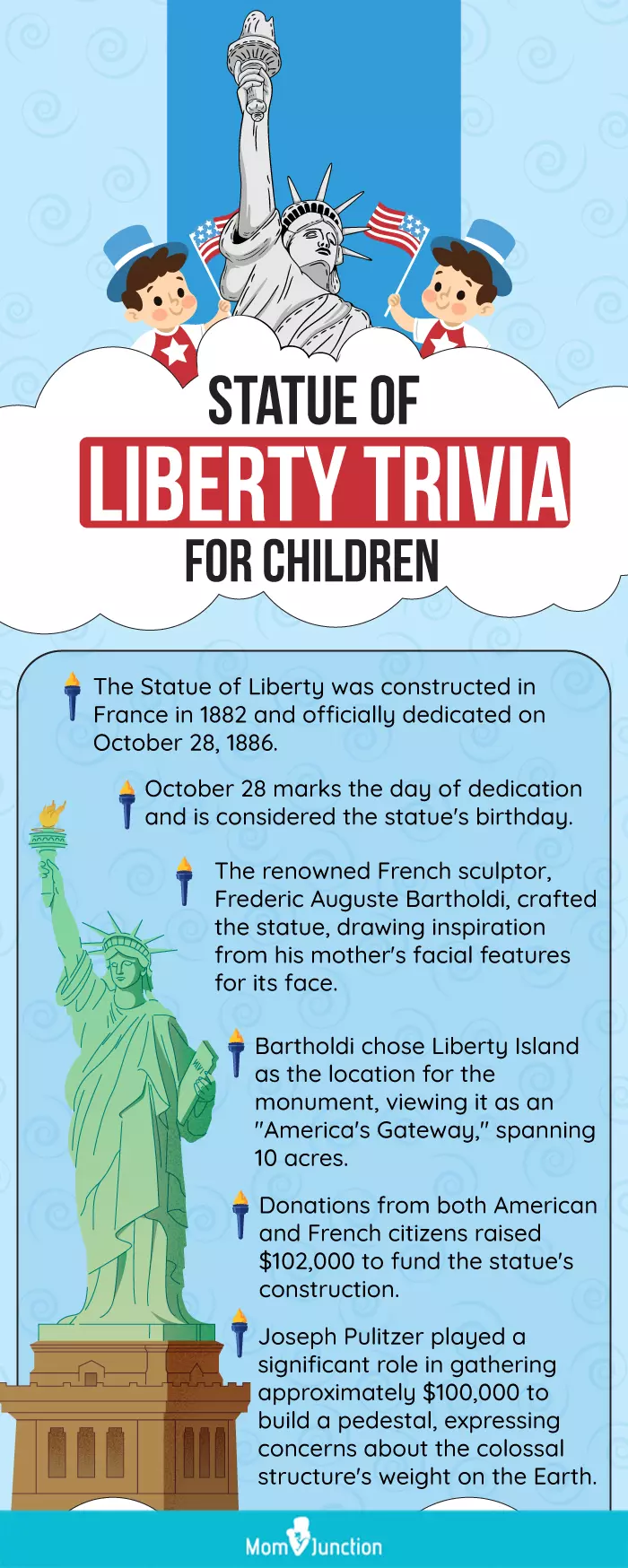
Illustration: Momjunction Design Team
Illustration: Fun Facts & Information About &039Statue Of Liberty&039 For Kids

Image: Stable Diffusion/MomJunction Design Team
Embark on an exciting journey to uncover the fascinating wonders of the renowned Statue of Liberty! Here in this video, we share a plethora of captivating facts that are sure to amaze and inspire young minds!
Personal Experience: Source
MomJunction articles include first-hand experiences to provide you with better insights through real-life narratives. Here are the sources of personal accounts referenced in this article.
i. 5 reasons to take your kids to visit the Statue of Liberty!https://www.momof6.com/family-road-trips/5-reasons-to-visit-the-statue-of-liberty-with-kids/
References
1. How tall is the Statue of Liberty?; How Tall Is The Statue of Liberty
2. Statue Of Liberty – Celebrating the Immigrant: An Administrative History; National Park Service
3. Physical Mobility in the Crown; National Park Service
4. Dimensions of the Statue of Liberty; Wonders of the World
5. Why Is the Statue Of Liberty Green?; National Center for Families Learning
6. Statue Of Liberty; Purdue University
7. Lady Liberty: 10 Fascinating Facts; The Battery
Community Experiences
Join the conversation and become a part of our nurturing community! Share your stories, experiences, and insights to connect with fellow parents.
Read full bio of Beth Sullivan
Read full bio of Sravani Rebbapragada
Read full bio of Harshita Makvana
Read full bio of Praggya Joshi










